Leading the Way to Better Player Development
The Value of Competition: The need to challenge our youth.
Claudio Reyna is the Sporting Director for New York City FC (NYCFC) and is a leader in the world of player development. Many consider Reyna to be one of the best players the USA has ever developed.
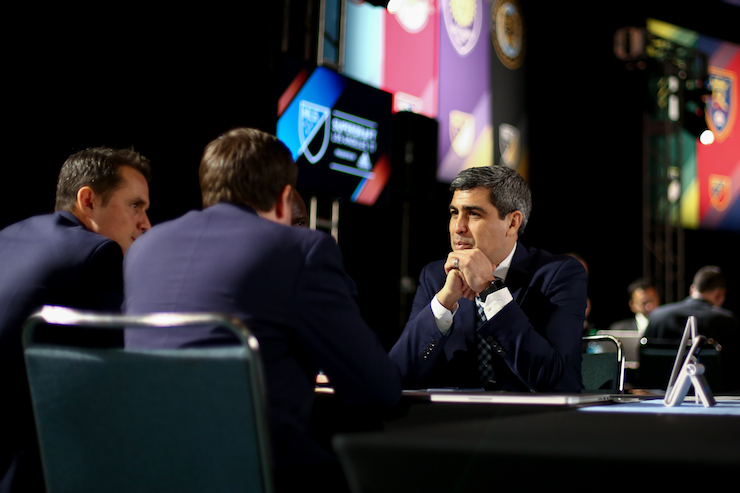
The former U.S. National Team captain from 1998–2007 represented the USA when he was 20-years old in the 1994 FIFA World Cup.
Four years later, in 1998, with teammates Tab Ramos, Brad Friedel, Cobi Jones, Eric Wynalda, Brian McBride, Alexi Lalas and then Captain Thomas Dooley, the team lost their 1998 World Cup matches but the players developed a winning mentality and many returned on the 2002 World Cup squad where the USA reached the quarterfinals. Reyna captained that team as well as the 2006 FIFA World Cup team.
New Jersey-born Reyna (Twitter) played in the German Bundesliga at Bayer Leverkusen and Wolfsburg, and played at the Glasgow Rangers, Sunderland, and Manchester City before joining and becoming captain of the New York Red Bulls.
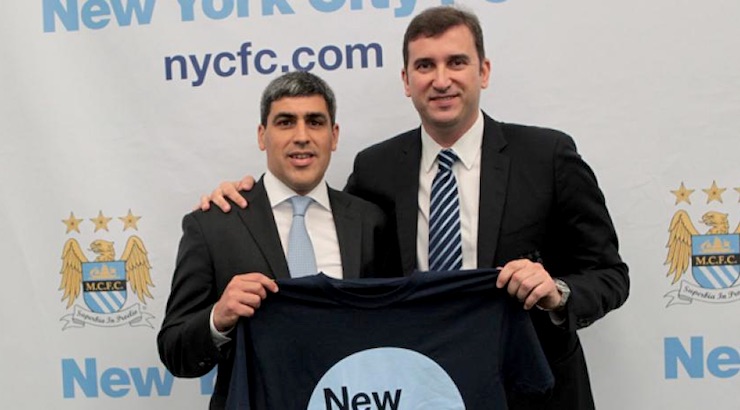
Reyna became the U.S. Soccer’s Youth Technical Director in 2010 when new leadership was needed to help develop and implement a long-term plan for improving youth soccer. In 2013, two years before the team’s launch in the MLS, Reyna became NYCFC’s first employee and was responsible for creating the soccer of the club’s organization, and oversaw the selection of players, coaches, and trainers.
While many of Reyna’s World Cup teammates have become familiar faces on TV, commentating on games, he has sought to fight for American soccer to improve from inside the trenches.
The NYCFC Academy, part of the U.S. Soccer Development Academy program, is now one of the top youth soccer development programs in the country.
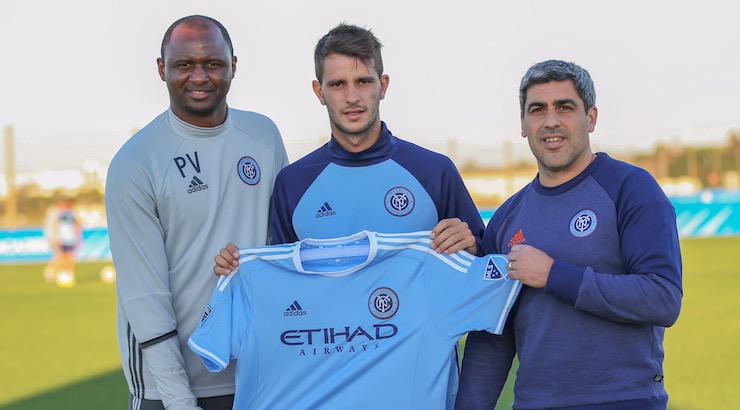
SoccerTodaty’s Diane Scavuzzo Interview with Claudio Reyna on youth soccer:
Diane Scavuzzo: Your NYCFC academy teams perform well, and the club is was so well respected — what’s your philosophy on player development?
Claudio Reyna: We take great pride in how our teams play, and our style of play at New York City Football Club, and that’s the compliment that we really appreciate and strive for, on top of also, trying to do well and get results.
It’s important in how we achieve results, so we encourage our players to play, and build from the back, and maintain possession, and be dangerous in attack, and play a 4-3-3 system all through our Academy up to our first team.
We believe in the way we play.
We feel our players enjoy playing in our system because it’s an attack-minded system, and gives them the freedom to go forward and play with confidence.
And more importantly, and probably most importantly, it’s a style of soccer and system of play that best develops players. And so, we’re really proud of it.
It’s not just about getting results for us. We take great pride in how we play, and our style of play.
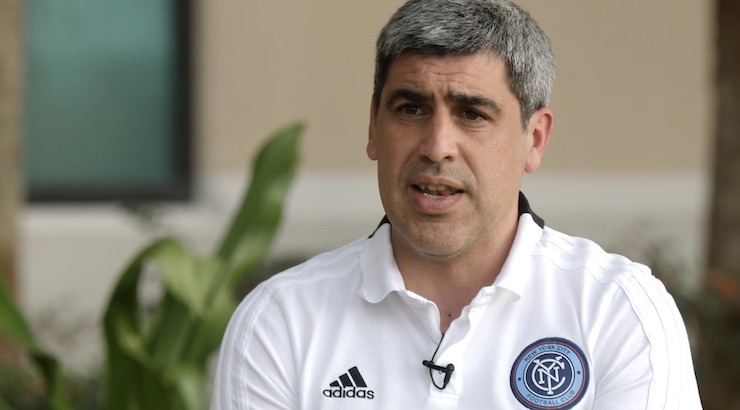
Diane Scavuzzo: Do you think your style of play encourages creativity and makes players feel less afraid of making mistakes, at the younger ages?
Claudio Reyna: Absolutely, yes. That’s what we emphasize … our Academy coaches wanting the players to be confident on the ball. All of our players. Even our first team, we have high expectations that they’re comfortable on the ball, and they’re all part of the game.
Everybody can attack. At the same time, everybody has to defend.
And, we want players to express themselves. And, again, I said it before, but at the younger ages, it’s very important that the players are given freedom to try things, of course, within the team concepts, and the collective game.
We want our attacking players to be creative and feel free to try things.
In soccer, you make mistakes, and you learn by these mistakes, so at the younger ages, they have to be given the freedom from the coaching staff, and overall, the Club, to be attack-oriented, and be creative, and express themselves.
Diane Scavuzzo: Do you think that players today have more advantages than you had when you were growing up?
When you grew up, there was not the Development Academy. There was not all the endless amount of structure. Do you think kids are better off today, or do you think your peers were better off?
Claudio Reyna: Honestly, I don’t know. I think what’s better today is that there’s more exposure for our players.
I had to travel with a local team to other countries to play in international competitions. Now, you have all of these different opportunities for elite players to be exposed to better players either through U.S. Soccer, the Development Academy, the MLS, and the GA Cup, and these international tournaments, like the Nexen Man City Cup. I think that’s really positive.

I also think the way we grew up was also good because I was always forced to play against older players, where now, I think the elite players, in my opinion, they stay too much in their age group.
When I was younger, it was no big deal that I was playing with 19-year-olds when I was 15 or playing with 17-year-olds when I was 13 — because they needed players. So, in a roundabout way, I was forced to play against older players, and it really helped me.
Now, I think there’s such an emphasis on … too much of an emphasis on keeping the best players on a team, just so the team could win.
And that didn’t exist when we were younger.
When I was young, all the better players … if you were good enough to play up two or three years, would do it.
So, I think some of the over-organization of all the leagues has created less opportunity for the elite players to challenge themselves, and play against older players.
I think that’s something that hurts player development.
Diane Scavuzzo: Do you have young players playing up at NYCFC?
Claudio Reyna: Yes, it’s something we believe in, at New York City FC. We have 12 under-17 players on the under-19 playing up all year.
We move all our best players up, as we have to create uncomfortable, challenging environments for our best players.
And I think, looking around the country, from what I see, and what I hear, too many of the clubs are keeping their best players at the age, so they can win. And that’s not good.
So this is the main difference that I see.
I literally grew up going to the park when I was 15-years-old and playing against men. Pick-up. And I think, you don’t have that anymore, because everything is so structured and organized.
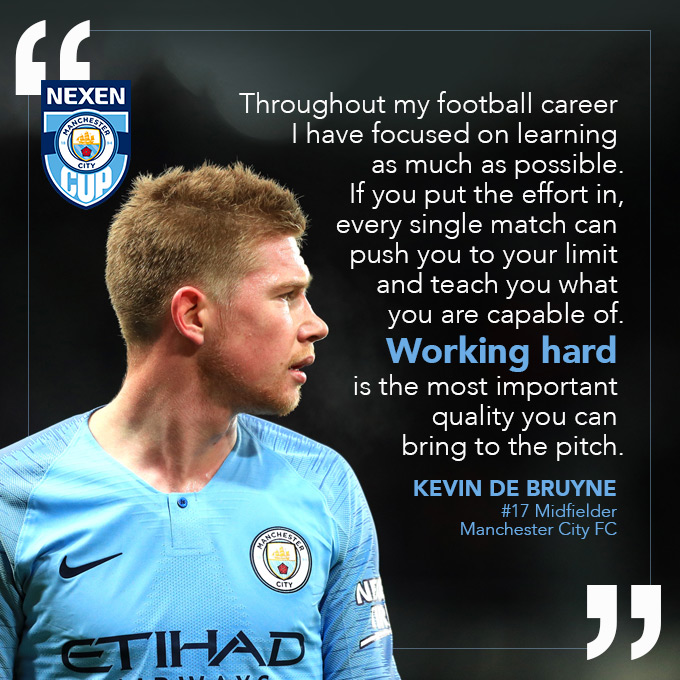
Diane Scavuzzo: How important do you think tournament-style competition is for kids?
Claudio Reyna: It’s important to learn how to win, but it’s more important to learn how to play.
The focus, in this country, is too often on winning. I’m not saying anything we don’t know. It’s just cultural, in our country — where you go to a U-10 game and people are going crazy on the sidelines, it is unlike any other country I’ve ever visited.
I think there’s a lot of organizations and like-minded parents and coaches who wish it didn’t happen. But unfortunately, that’s what we are.
There’s such an emphasis on our kids winning a trophy, that we lose sight of what’s more important, which is teaching the game, and that players learn how to play the right way. But that’s the reality of the soccer environment for young players in our country.
Diane Scavuzzo: So, if you could say something to all of the coaches who look at the stats more than they look at their players, or are more concerned about recruiting and retention than development, what would it be?
Claudio Reyna: Well, I would hope every coach in the country, and every organization didn’t care about rankings, and player rankings, and team rankings, and state rankings, because it means absolutely nothing.
They should focus on creating the right environment for players. We have a lot of sites that rank players, and rank boys and girls on all this kind of stuff that, unfortunately, people buy into, in our country, and think that it’s important, but it’s absolutely meaningless for young players, boys and girls, in their development of learning the sport.
It’s a unique, American phenomenon.
There’s no other country in the world where you go, and there are team rankings of all ages and coaches who are getting ranked.
And what I would say is, we lose sight and focus on what’s most important.
And it’s not just soccer, it’s all the youth sports in the United States which are, unfortunately, focused on the wrong things.
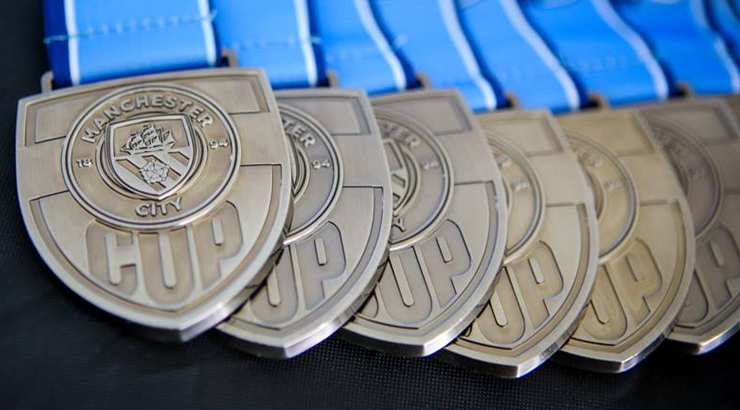
Diane Scavuzzo: New York City FC had two Academy teams compete in the Nexen Manchester City Cup last year and teams will be competing again this year. Nearly 3,000 miles separate NYC from San Diego, from your perspective, what do you believe is the value of a youth soccer tournament like this?
Claudio Reyna: The Nexen Man City Cup is a great tournament for our under 13s and our under 14s to be a part of — for many different reasons.
One of them, obviously, is for the competition, to see where they’re at against some of the best MLS teams, some of the best non-MLS American teams, as well as strong international competition.
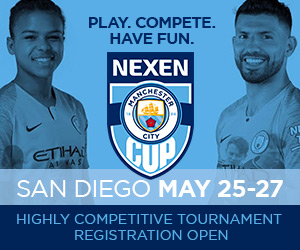
It’s good for our players to really face international competition, where the players are different than what they see here in the U.S., and it’s an incredible experience to travel as a group, and play in a beautiful area of the country, that maybe, none of them have ever been to. These one week-type tournaments — it’s hard to explain the development and the growth that a young player goes through being part of a tournament like this.
It is really great for our young players to have to be responsible on the trip, and at hotels, and enjoy the comradery that it brings for our Academy boys traveling with two teams together. So, we’re very excited.
Diane Scavuzzo: What do you think of the level of competition at the Nexen Man City Cup? What do you think are the differences between your New York City FC Academy teams and those from your sister organization, Man City?
Claudio Reyna: I think we’re a younger Academy here at New York City FC, so we’re still growing — and to test our players, and our teams against some of the best youth Academy’s around the world — this is great.
Against this competition, they get to really test themselves, and it’s very humbling. I think it’s a great experience that a player gets put in a challenging environment at a young age. And so, by playing these teams, they will get that. And you get to learn how our players will respond to these difficult games.
But it’s more than anything, it should be a fun experience.
We want them to enjoy themselves. There’s no pressure at these ages — they need to have a really good experience, and test themselves, and really enter the tournament, free to express themselves and be confident against these teams.
Just test themselves and enjoy it. So, we’re really excited about it.
When you play Man City, you’re playing against one of the best Academy’s in England and Europe — you can’t ask for anything else if you’re a young player.
And, we’re delighted that in New York, now with our Academy’s growing, we’re able to bring top talent to our club and then be able to provide them with an experience like this, at the Nexen Manchester City Cup.





